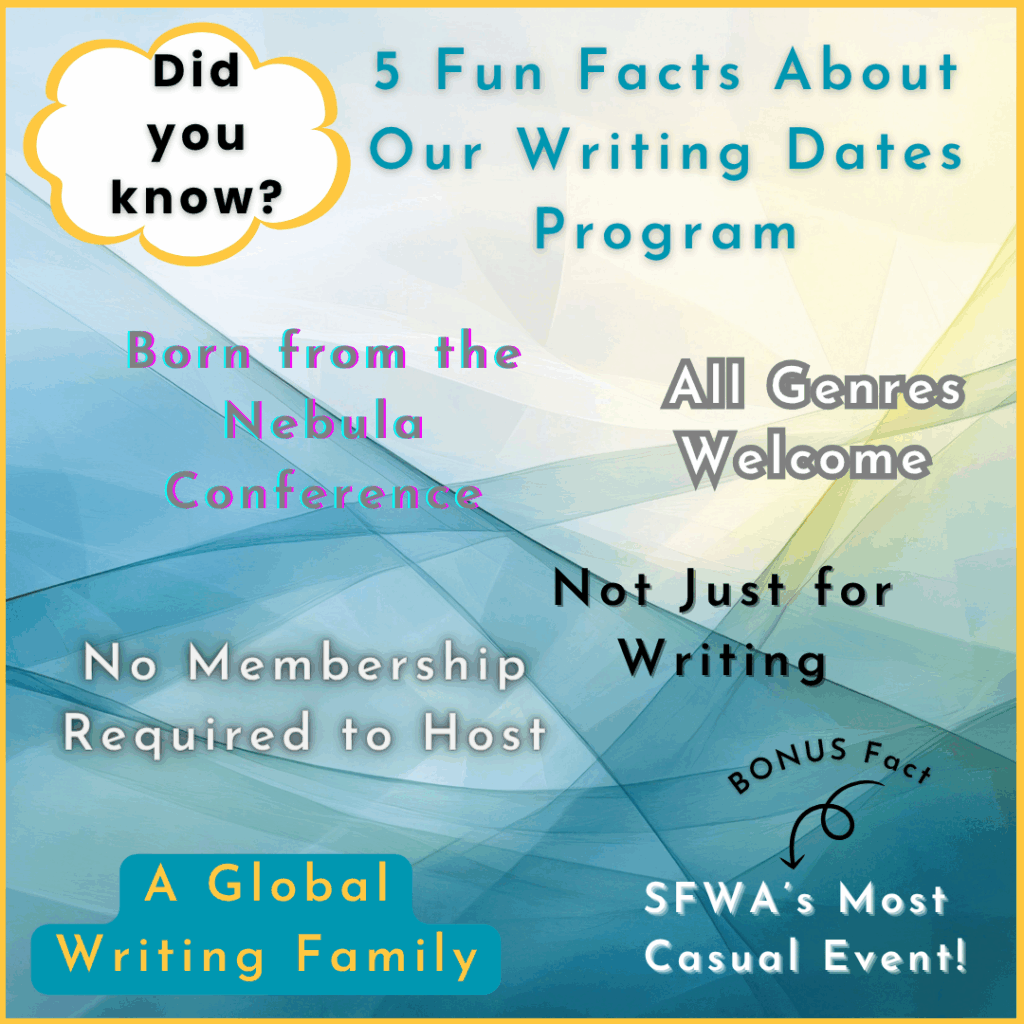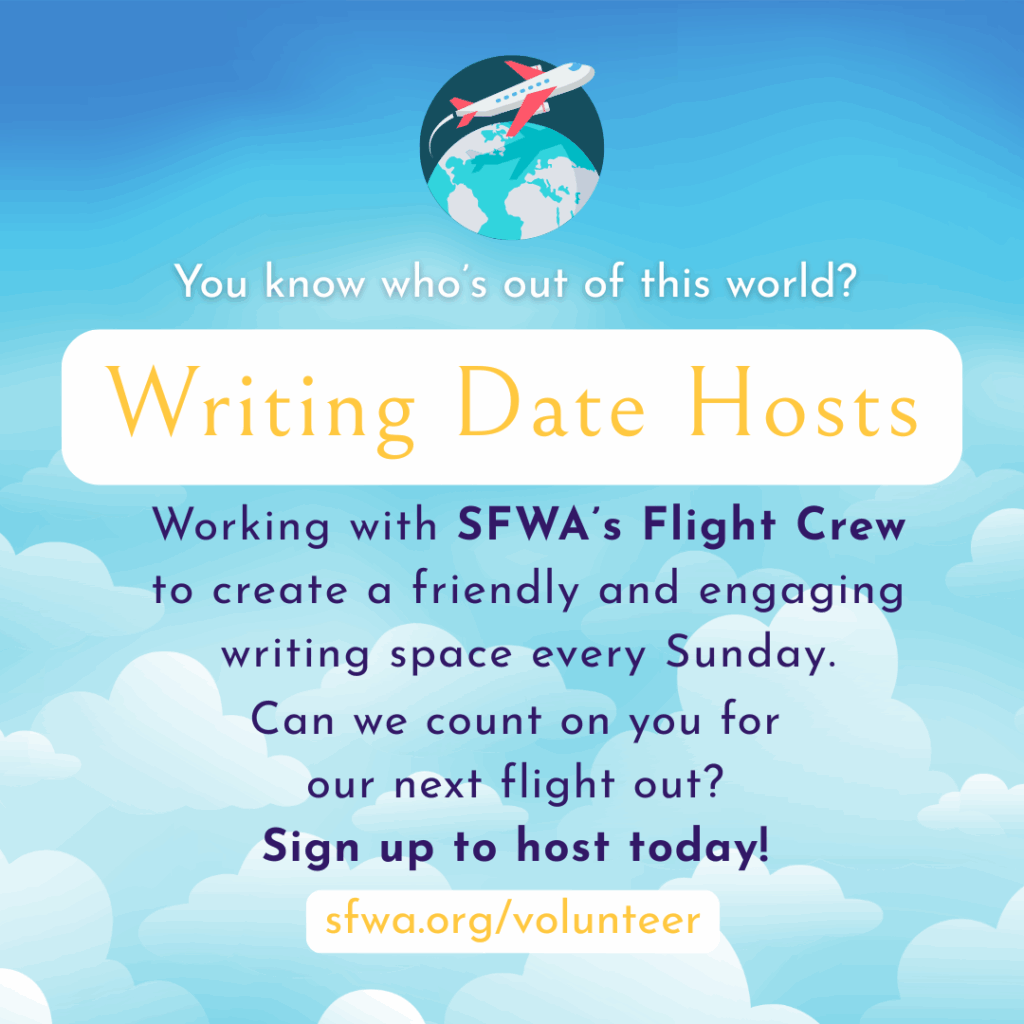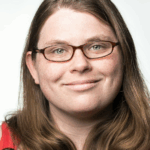by the Planetside Crew

Editor’s note: This article is part of the SFWA Presents: Get to Know… series, which includes informational pieces about SFWA programs, committees, and initiatives, and also interviews with the SFWA volunteers who work to support their fellow writers in the industry.
One of SFWA’s most accessible member services is our Writing Dates Program, a weekly online co-working writing date with a different host every session. It runs on Sundays from 2:00 to 4:00 p.m. PST in the Nebula Zoom (a.k.a. the Airship Nebula), and the sessions are open to all SFWA members and attendees of the Nebula Conference. You do not need to be a SFWA member or Nebula attendee to be a host.
We chatted with the Writing Dates Program Team to learn more. This interview features insights from team members C. J. Lavigne and Kristin Osani, with Meagen Voss providing editorial input.
SFWA’s Writing Dates Program has been running since the 2020 virtual Nebula Conference. How did the idea for Writing Dates come about, and what were those first sessions like in terms of member response and momentum?
Kristin: I think it was Mary Robinette Kowal who originally started them (C. J. can correct me if I’m wrong). The 2020 virtual Nebula Conference was such a fantastic weekend. I know a lot of us didn’t want it to be over, so that may have been the impetus. C. J. started helping out as a volunteer with those initial ones. Then Meagen Voss and I joined a few weeks later (I missed the first few sessions because of the time difference), but they were immediately popular and well-received because so many of us were in need of community at the start of the pandemic—and still are! We have a solid group of regulars who have been attending ever since and have been gaining more each year.
C. J.: It was absolutely Mary Robinette; I offered to lend a hand a couple of weeks in, then kind of inherited the tech support role, which spread out to the Writing Dates team. We had enthusiastic regulars from the get-go—some of them are still with us, and they’ve been logging in weekly for the past five years and counting. 2020 was a really uncertain summer for a lot of mysterious reasons I’m sure no one remembers, and I think a lot of us were looking for some stability in our schedules, not to mention new writing friends. We had a lot of cheerfully awkward getting-to-know-yous and some great enthusiastic host authors (some of whom, again, have come back repeatedly).

What brought you to this SFWA volunteer role? How has your experience in the publishing industry shaped the way you support and connect with other members through Writing Dates?
Kristin: I first volunteered for SFWA at the 2020 virtual Nebula Conference, which is where I initially met C. J. and so many other wonderful folks, so when I started attending the writing dates and noticed C. J. would hang out by herself during the mid-date break while the rest of the attendees split off into the breakout rooms, I ended up staying in the main room to chat with her (and also because she was a familiar face and I am a shy introvert), and then ended up asking if she’d like help running the dates from there. My professional writing career really only took off after getting involved with SFWA and the writing dates specifically because I had that community around me to keep me going when things got tough (and things are always tough in this industry), so I’d say it’s more the writing dates and the friends I’ve made through them that have shaped my experience in publishing rather than the other way around.
C. J.: Hah, I sound sad here! OK, yes, I am an introvert, but to be clear, “C. J. would hang out by herself during the break” means “C. J. stayed in the main Zoom room to welcome latecomers,” haha. So I appreciated Kristin’s company. And, yes, I first started volunteering for SFWA in 2020 because I was attending the Nebulas for the first time, and I always volunteer if I’m looking to get to know people. Professionally, I had signed my first novel with a small press, it was just coming out, and I was looking to get to know folks in the industry. Since then, some of us have built professional connections outside of the writing date in any number of ways, forming critique groups, speaking together on conference panels, writing each other’s cover blurbs, attending each other’s events, and talking up each other’s works. I agree with Kristin; the core writing date group has really shaped my experience of the community and industry, and made it really welcoming.
How would you describe the purpose and structure of Writing Dates to someone new to SFWA?
Kristin: The structure is 15 minutes of chat and introductions, 45 minutes of muted concentration time, 15 minutes in breakout rooms for more chats, and a final 45 minutes of muted concentration time. And that’s it! It’s very casual. We also have an unofficial extra half hour at the end of the dates to just hang out and socialize. We’re there to support each other and hang out, and maybe get a word or two written (or do taxes, or admin work, or whatever it is you need to do to make way for writing at some point).
C. J.: Yup, that’s it. I like to tell people this is the most casual event SFWA runs, whether they’re attending or being a host author. It’s just chatting and writing! No expectations, no competition, no recordings, no pressure to share.
What are the host’s responsibilities?
Kristin: Mostly it’s just to facilitate the chat and introductions during the first 15 minutes. The host generally will introduce themself, tell us about their work and perhaps what they’re currently working on, and then go around and have participants introduce themselves (if they want to). And that’s it! Some hosts ask an icebreaker question like “What’s your favorite fantastical creature?” but that’s going above and beyond. Hosts CAN keep track of time if they’d like, to let us know when it’s time to write and when our mid-date break is, but the Flight Crew (the group of volunteers who help with SFWA’s online events, including the three of us) is used to being the timekeepers by now.

How do sessions accommodate different writing styles and genres?
Kristin: We welcome all writing styles and genres! Like I mentioned before, some folks even use the 45-minute concentration blocks to get other tasks done. It’s your time; we’re just there to support you, however you choose to use it!
C. J.: We’ve definitely had graphic novelists, creative nonfiction writers, mystery writers, and other folks host the event. Anyone with an interest in speculative topics is welcome, and people are working on all kinds of projects.
What do participants typically gain from attending Writing Dates, creatively or professionally?
Kristin: Friends, community, support, validation, the chance to meet other authors working towards the same goal. A lot of people report they are more productive during these dates than usual, so a boost to motivation and word count as well!
C. J.: I feel like the importance of making friends really can’t be overstated—not “networking” in some calculatedly artificial way, but just hanging out with people and talking about writing, but also life and video games and pets and whatnot. It’s a fantastic group.
Does the Writing Dates Program influence your own writing practice in any way?
Kristin: Oh, absolutely. They’re early Monday mornings for me (I live in Japan), so they really jump-start my week.
C. J.: Kristin and a couple of other folks in spread-out time zones are heroes for logging on in the middle of the night or at the crack of dawn. For me, I find it’s helpful just to remember to touch base once a week—I’m the kind of writer who tries to work on projects daily, but life gets busy, and if things are overwhelming, I’ve still set aside those two hours on Sunday.
Can you share a memorable moment or success story from a Writing Dates session?
Kristin: Lots of our regulars have worked on pieces during the writing dates that have gone on to be nominated for and even win awards!
C. J.: I don’t want to single anyone out, but for sure, so many regulars (including me and Kristin) have published work that they produced during these sessions, and some have been on major award lists or are now award winners. I’ve cheered myself hoarse for our Writing Dates folks! I love it.
What feedback have you heard from participants about how Writing Dates have influenced their work or habits?
Kristin: Overwhelmingly positive. People tell us all the time how productive they are during the dates. And more than just word count, people have made friends and even found critique partners through them.
C. J.: I think the best feedback is that people just keep coming back.
What would you say to someone hesitant to join because of time constraints or uncertainty?
Kristin: You don’t have to come every week, and you don’t have to come at the very start of the event or stay for the whole thing. Just show up when you can, if you can, even if it’s only for the last five minutes.
C. J.: Did I already say it was the most casual event? The most casual event! Come, go, do what you can.
If you could shape the future of Writing Dates in any way, what would that be?
Kristin: Honestly, just that they’ll go on forever! Maybe a couple other sessions at times more friendly to folks not in North America, though that all depends on volunteer availability.
C. J.: Kristin in particular has worked very hard to support folks in varied time zones, and that’s something we have our eye on if opportunities arise. For the future of the current Writing Date Program, though, I just hope people keep feeling connected and keep logging in.
Huge thanks to our Writing Dates volunteers for making this program a supportive and creative space for fellow writers.
To join the Writing Dates Program, please visit https://events.sfwa.org/upcoming-events/. You don’t need to register in advance, but you must be logged into your SFWA account or Nebula membership to access the Zoom link on the events page.
Explore more articles from SFWA Presents: Get to Know…

C. J. Lavigne is a Canadian SFF author. Her urban fantasy novel In Veritas (NeWest Press, 2020) was a finalist for the 2023 Rakuten Kobo Emerging Writer Prize in Speculative Fiction and the 2021 Crawford Award, and was the Book Publishers Association of Alberta 2021 Speculative Fiction Book of the Year. Her short fiction has appeared in On Spec, Fusion Fragment, Augur Magazine, Daily Science Fiction, PodCastle, and other publications, and her novella The Drowned Man’s Daughter was released by NeWest Press in September 2025. She is generally busy drinking coffee, petting the cat, and being a full-time media studies academic. Find her online at www.cjlavigne.com.
 Kristin Osani (she/her) is a queer fantasy writer who lives with her husband in northeastern Japan, where she works as a freelance Japanese-to-English translator when she’s not wordsmithing, working on nerdy cross-stitching, or cuddling her two cats. She has translated games like The Kids We Were, Voice of Cards, and Triangle Strategy, and has also edited manga for Kodansha USA. Her original fiction has appeared in FlashPoint SF, The Arcanist, and Beyond the Veil: Supernatural Tales of Queer Love (Ghost Orchid Press, 2022). Her debut novella, The Extravaganza Eternia (Ghost Orchid Press, 2024), is a semifinalist in the 2025 Small Spec Book Awards. You can find her on Bluesky @kristinosani.bsky.social or on her website at kristinosani.com.
Kristin Osani (she/her) is a queer fantasy writer who lives with her husband in northeastern Japan, where she works as a freelance Japanese-to-English translator when she’s not wordsmithing, working on nerdy cross-stitching, or cuddling her two cats. She has translated games like The Kids We Were, Voice of Cards, and Triangle Strategy, and has also edited manga for Kodansha USA. Her original fiction has appeared in FlashPoint SF, The Arcanist, and Beyond the Veil: Supernatural Tales of Queer Love (Ghost Orchid Press, 2022). Her debut novella, The Extravaganza Eternia (Ghost Orchid Press, 2024), is a semifinalist in the 2025 Small Spec Book Awards. You can find her on Bluesky @kristinosani.bsky.social or on her website at kristinosani.com.
 Meagen Voss is an Open Source community manager for the Wagtail CMS project by day and a speculative fiction and romance writer by night. She has tried her hand at most jobs in publishing and decided that doing the tech was her thing. Her journey into content management nerdery began with a WordPress site in the early 2000s, and now she is supporting publishing software that helps non-profits and other groups doing good in the world. When she’s not coding or writing, you can find her staring at waterfalls and hiking around the mountains of North Carolina.
Meagen Voss is an Open Source community manager for the Wagtail CMS project by day and a speculative fiction and romance writer by night. She has tried her hand at most jobs in publishing and decided that doing the tech was her thing. Her journey into content management nerdery began with a WordPress site in the early 2000s, and now she is supporting publishing software that helps non-profits and other groups doing good in the world. When she’s not coding or writing, you can find her staring at waterfalls and hiking around the mountains of North Carolina.
